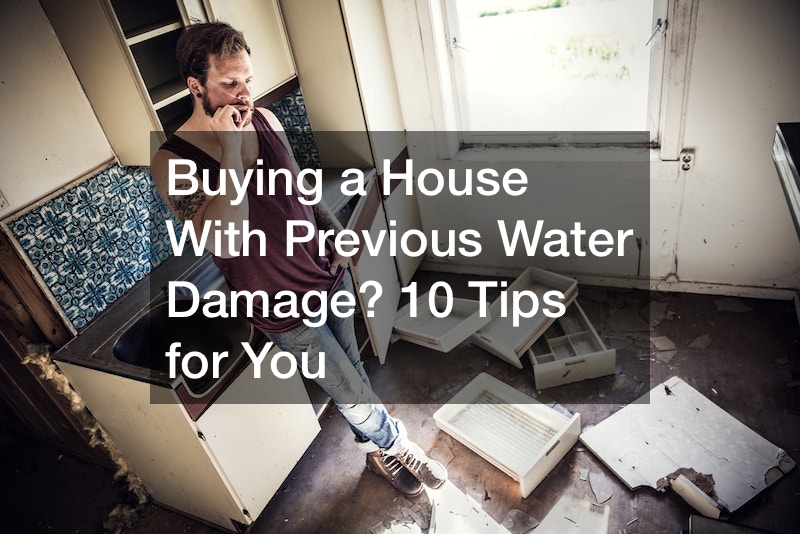Disclaimer: Charms Ville. This site provides fashion and lifestyle content for informational purposes only.
Buying a house with previous water damage might seem like it could be an advantage. To some investors, it means lower costs on property taxes, fixed insurance rates, or even more negotiating power during contract negotiations. Still, for some people, such a purchase might not be worth the investment. Water damage can lead to severe home problems, including mold growth and structural damage. It would help to look into the following when buying a house with previous water damage.
1. Consider a Home Inspection

One thing to remember when buying a house with previous water damage is that there may be issues with the walls and floors. That can make it difficult for anyone to decide whether or not the home is worth repairing. It may also be challenging to determine if it would be better for you to find another place to live. If you do not want any extra expenses for repairs, consider hiring a professional to inspect the house before you buy it.
Leaks can happen in a large number of places on your roof. Hiring a leak detection service or checking it yourself is vital before you make an offer. A home inspection can allow you to determine whether or not you would be able to afford repairs in the future. A home inspector has expertise in evaluating various aspects of the property, such as the plumbing system and the entire house.
You should always inspect a property before buying it. If there is something wrong with the home, inspecting it will save you money because you may decide not to end up purchasing it. Hiring a professional home inspector ensures you know what repairs you must make on a property before you decide to buy it.
2. Consult Professionals
Fraud is a constant worry when buying a house with previous water damage. But in this case, it is not the seller or realtor trying to dupe you. Instead, it is the seller’s profession that can potentially be misleading. There are quite a few things that can go wrong when purchasing property in flood-prone areas, where water damage is more common.
In addition, there are many caveats to consider when making the purchase. The advice of a home remodeling company, among other professionals, will be invaluable tools for your success in the purchase. Even if you have bought and sold multiple homes in your life, it is essential to note that each one is different. Consulting experts is one of the most critical steps in ensuring you get the property you want.
A home appraisal is an effective tool in the buying process and one that you should consider keeping forever. The thing to remember about an appraisal is that it complements the inspection. It also serves as an extra piece of advice if there are some questions. Starting without a professional to look over your house could come back to haunt you later on down the line. As such, give this important step some thought beforehand.
3. Obtain Homeowners Insurance

When buying a house with previous water damage, getting homeowners insurance is one of the many things to consider before you take the plunge. First, remember that any home with a water leak or flood issue will likely require some level of construction and repair. A person buying a house with previous water damage may have concerns about contaminants such as mold.
Mold can be harmful to your health. It is best not to overlook inspecting a property for this before purchase. An inspection will ensure that it has no significant upkeep problems before you buy. After inspecting the property and seeing signs of mold, you may need to hire an expert in mold damage restoration to deal with mold growth. The type of insurance coverage you look for when buying a house is essential.
On top of the regular homeowner’s insurance, you may also want to consider flood insurance. The coverage is optional. That said, if floods are common in the area you intend to buy the house, protecting yourself from them is essential. As long as you take these steps, buying a house with previous water damage can still be an innovative and affordable way to purchase your next property.
4. Get Estimates of the Cost of Repairs From Contractors
One of the biggest headaches when buying a house is figuring out how much it will cost to repair any damage. The process can be complicated. Before buying a house with previous water damage, knowing how much it will cost to do the necessary repairs is beneficial.
Getting an estimate of damage costs for your home’s water damage can be challenging because there are many factors to consider. You might need to consult a professional on more than one occasion if you are unfamiliar with how the process works. Insurance firms want to get your business. They might tell you that the estimate will be lower than it is.
One thing you can do is look for contractors specializing in water and storm damage services. Contractors typically have better equipment and a team of experts who know what they are doing. These professionals might tell you that it will cost much more than if you go through an insurance company.
5. Know When Not to Buy

There is a lot of potential for dealing with unexpected problems after buying a house with previous damage. Some issues can be more costly and time-consuming to fix than others. Others may be less easy to detect. For a house that has had water damage, you will want to know more about it. Many sellers will try and downplay the severity of previous water damage. Consulting experts is your best bet for getting the facts about what kind of damages might exist and how severe they might be.
Never ignore big problems, such as mold or foundation issues, even if you think they will not be a problem immediately. Often, major foundation issues can lead to more significant and costly problems down the road. For instance, there may be extensive water damage to your home’s foundation and framing. In that case, it is best not to invest in the property and start looking at the rest of the house.
Wind, storms, and other forms of weather can have a damaging effect on water damage. Never buy a house in an area with lots of wind or where the water sources are unreliable. If the previous owner witnesses some kind of storm or has seen evidence of it, you can be sure that problems like this could exist. Repairing various parts of your home will cost multiple times more than going for something better in the first place.
6. Protect the Home From Future Water Damage
Water damage is a reality for many homeowners. It is especially the case when buying a house with previous water damage. It is best to protect the home you plan to buy from future water damage. A waterproofing contractor can come in handy in providing this protection to your property. You can also ensure that your plumbing has a drip pan below it to avoid future water damage.
Another option is installing an overflow valve on your sinks. The valve allows the sink to drain without overflowing when the flange gets plugged. Drip pans and overflow valves are worth the price compared to the cost of repairing a water-damaged house. You may want to hire a plumber to install them so you do not have to deal with future water damage.
There are many ways of protecting your home from future water damage. Still, none are foolproof or guaranteed to work in every case. Not protecting your home from water damage may present a nasty surprise later on. For instance, when you have to hire a flooring contractor to replace the floorboards in your dining room. Whatever you do, do not ignore a water damage problem and hope it does not happen again.
7. Take Inventory of Water Heaters, Plumbing, and Electrical Systems

Several household appliances and items may have a significant impact on your purchase. Anytime you think of buying a house, it is worth taking a step back and taking inventory of the water heaters, plumbing, and electrical systems. Often, investors may seek to evaluate the condition of things like heavy duty pressure washers in a property.
It is a good idea to keep track of every piece of equipment in your house to have a complete inventory. Some other things that are good to explore before purchasing are what type of heating system the home has and any information on insulation in the attic or crawl space. You may also want to note whether there is an attached garage or if they have brick walls.
You might want to make an inventory list at the outset so you can take a look at all of your appliances, fixtures, and other items. Doing this will assist you in deciding what bid you will place. You may buy the property for a lower value, or you may need to spend on things like water pump repair services or any other services for repairs to the property.
8. Do Your Research
Research is often a step people overlook when buying a house with previous water damage. The big problem with water damage is that it is tough to detect. This is because it can grow on walls, ceilings, and floors. One of the most common signs of water damage is mold. It grows where moisture has been present for an extended period.
Before investing in a property, research can help you avoid paying high prices for repairs later on. You first want to work with a realtor who has experience buying and selling homes that have experienced previous water damage. These professionals should be able to tell right off the bat if there is a problem with moisture in your new home. Even if this damage seems minor now, it could significantly affect your pocketbook down the road.
The best way to go about this is by looking at the basement area of your new property. This is where most water damage happens because of leaking pipes, etc. If there is water damage here, ask your realtor to look at it too. You want to ensure that you do not spend your hard-earned cash on a new home only to find out later that the previous owner did not even try to fix the problem.
9. Do Not Take Shortcuts

Buying a house with previous water damage is not always an easy task. Knowing about the problem and severity of the damage beforehand can impact your offer, how quickly you want to fix the issue, how much insurance coverage you need, and when it may be time to walk away. Awareness of issues before you buy will help avoid surprises after closing the deal.
There may be damage on the outside or inside of a house. It is best to determine whether the water source was from a pipe break, a leaking faucet, or flooding caused by heavy rains. Open up cabinets and look at the backside or underside. This is where mold could grow after the water has flooded an area near plumbing. Do not assume that water damage outside a house means no problem inside.
Also, do not rely on just one type of mitigation method. Suppose it was flooding that damaged your property, and you are unsure which source did the damage. In that case, having an array of options can help to determine what will work best for your situation.
10. Make a List of Things That Need Repairing
When buying or selling a home, there is a lot to be aware of and know. Making an initial list of repairs will ensure all necessary work is done before shifting into your new place. Professionals can provide construction bids for your review and approval before any work begins on your property.
The inspection process determines how much the water has impacted your home. By bringing in someone with enough experience to do this, you will be able to determine what you must repair before settling in. Make sure that all neighboring homes look good. Ensure that none have any significant problems like clogged drains or broken windows.
Problems such as these can be the cause of water damage in your own home. While looking around, pay special attention to the roof and gutters. If you notice that a neighbor’s roof looks in poor condition, it may have been the source of a leak in your home. Also, make sure that gutters are clean and not clogged with debris.
During a home purchase, there is always the chance of finding unexpected issues. One common issue is that the property may have previously been flooded. When buying a house with previous water damage, the best thing you can do is conduct extensive research. Taking your time to assess the property will ensure you get a high return on investment from the purchase.



